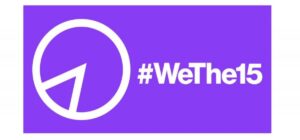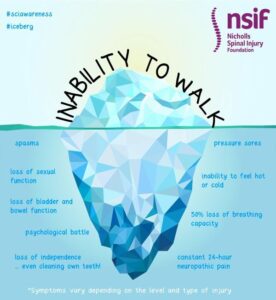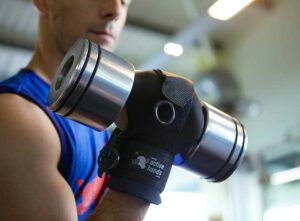Your basket is currently empty!
#Wethe15
Paralympic Legacy
As the Paralympics draw to a close, the visibility of disabled people on our TVs and social media reduces. So, how do we keep promoting inclusivity and equality for the 15% of our global population that have a disability? #Wethe15 hopes to find the solutions.
Launched at the Tokyo 2020 Paralympics, #Wethe15 is sport’s biggest ever human rights movement to end discrimination. A coalition of international organisations from sport, human rights, policy, arts and business, they aim to affect change for anyone with a disability. With a focus on inclusivity and accessibility, they are a global movement that we at Active Hands are pleased to support.

Personal Experience
Our director, Rob Smith, sustained a Spinal Cord Injury over 25 years ago. Speaking about his experiences as a disabled person, Rob describes the misconceptions people often hold about his disability.
Perception of disability from able-bodied people is that the worst possible aspect is that wheelchair users can’t stand up and walk around. This may be the thing a few wheelchair users miss the most. In my experience, and the experience of most others I have spoken to, that is not the main issue. Often it is the ‘hidden’ effects of our disabilities that are far more frustrating. Challenges such as bladder, bowel or sexual function, muscle spasm/contractions, or reduced hand function.

This misconception amongst many able-bodied designers means that the focus has often been on designing and manufacturing products such as wheelchairs, exo-skeletons and mobility devices. This is the main reason I started Active Hands. I wanted to address the lack of products available specifically designed to address reduced hand function.
Discrimination
Despite the recognition of Paralympic athletes as heroes and inspirations, #Wethe15 points out that the daily lived experience of many disabled people still includes facing discrimination. Rob explains:
There have been times I have been refused admission to places, not been able to hail a taxi, often not been able to access certain buildings etc. Before running Active Hands I ran a small events company. Disability is just not really represented in this area. I would often notice a wariness and concern regarding my ability from clients on meeting me in person compared to email contact. In all areas of the events industry I had to battle against prejudice relating to my disability. It was always seen as a negative. Active Hands has been so positive in comparison. My disability and personal subject knowledge give me a real advantage over an able-bodied person.

Future Hopes
Working across the globe, #Wethe15 hopes to build greater knowledge of the barriers and discrimination persons with disabilities face. By doing so, they aim to break down those barriers so that all persons with disabilities can fulfil their potential and be active and visible members of an inclusive society. This visibility is crucial in all areas of life, as Rob explains.
Since London 2012, I have noticed a significant change in attitudes to disability. There are now numerous disabled people who are household names to able-bodied people in the UK. Many are previous Paralympic athletes who have gone on to present TV programs, make documentaries or compete in cooking, dancing and reality TV shows. However, others were not paralympians and this is also great to see. The inclusion and visibility of disability in all areas of life is important. Disabled people make up 15% of the population. For a fair and representative society we should be seeing the same sort of representation figures on our screens, in our boardrooms, as our politicians and in all those decision making roles behind the scenes. This is the way to make the shift in society from tokenism to true representation.
The Shaw Trust Power 100 is an annual publication from the UK. It aims to raise the profile of disabled people working across all sectors. Each year it releases its list of the most influential disabled people, celebrating the contributions and innovations made by disabled people in sport, business and the arts. As a previous chair of the judging panel, Kate Nash OBE wrote,
What we have is an incredible list of ‘powerful’ individuals who are really creating waves, breaking down barriers and working hard to create a more inclusive world for everyone.
Kate Nash OBE
Equal Access
A key goal of Active Hands has always been to enable those with reduced hand function to integrate within the society we live in. This is why the current range of Active Hands gym products were created. These allow users to access equipment, which would otherwise be impossible to use due to reduced hand function. With the right gripping aid, disabled people and able-bodied people are able to workout alongside each other and access the same equipment.
Rob is passionate about this aspect of Active Hands’ work.
We understand the frustrations of reduced hand function in all areas of life. We are constantly trying to design or find products to help our customers overcome these. As the company has expanded we have had to learn about many other disabilities that affect hand function and how to design products to overcome those specific needs. This has been an interesting challenge. We are still learning and still designing. We always have around 5 products in various stages between initial concept to pre-launch production, which is a part of the business I really like. However, the best part is knowing that over the years Active Hands have helped to facilitate increased participation in thousands of activities all over the world for people who would otherwise struggle with inclusion in activities without our products.
We are proud to support the work of #Wethe15 and hope that through our products we can help people with disabilities to lead active, independent lives in all sectors, increasing visibility and inclusivity for all.
Johanna Smith
